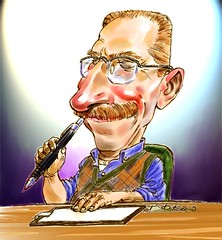 On December 29 passed away the great American artist who revived the journalistic caricature in the sixties and established the style for others until his retirement three years ago.
On December 29 passed away the great American artist who revived the journalistic caricature in the sixties and established the style for others until his retirement three years ago.
Perhaps he regarded himself as a painter “who did caricatures for a living”. But his published works show the evidence of his true commitment with his subjects as well as with his ethics.
Born in a Jewish working class family, he never lost his attachment to the old socialist Yiddish culture. The same one which saw the Western Civilization to betray the humanistic promises of the Enlightenment and became crushed in the Holocaust. Todays predominance of religious, nationalistic tendencies amid the Jewish communities can’t be understood without taking this material and cultural catastrophe into account.
Being myself the offspring of one of the remnants of this almost extinct culture I felt close to Levine’s approach to caricature. But i never heard of him until my mid twenties after some years of Art (and History) studies and portraiture practice. He became decisive in my life turn nonetheless.
I went to study History in Jerusalem after the military Junta took over in Argentina and used to do portraits outside the Old City to supplement my scholarship but never felt comfortable there (their view of History was too conservative to my taste). I had no idea what to do or where to live when an article from The International Herald Tribune felt into my hands. It was headlined “The fine line of David Levine” and contained an interview together with some of his drawings. Then I knew what to do. I went to Tel-Aviv with a “portfolio” of just three caricatures (Carter, Sadat, Begin); asked for anybody (Lapid) at any newspaper (Maariv) and got my first job.
I never dreamed of become a pro caricaturist before. I was a fan of Hermenegildo Sábat, the Uruguayan caricaturist who shocked the media in Argentina with his crosshatching (close to that of Levine) in the seventies. But his style was too wild to follow after. Levine had a more rationalist approach, closer to my sensitivity. He opened the path along which I walked since 1978 and I’m grateful to him for that.
Farewell maestro!



gafuerst
March 12, 2018
I find your commentary and your cartoon to be most fitting for a great artist!
Bob Row
March 12, 2018
Thanks! He deserved it.